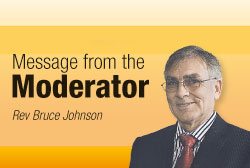
MOST OF us have seen the sign: “There are no strangers here, only friends we haven’t met yet”.
That might be true but we all know that sometimes it can be a long journey from stranger to friend. We are naturally cautious when we meet with strangers. What are these strangers like? Are they friend or foe? Are they a threat to my peace and wellbeing or will they enhance my life?
What might they want from me? Do we have anything in common?
There have been centuries of inter-religious conflict that have fuelled our fears and distrust of people whose beliefs are not the same as ours.
This is true of others who claim the Christian faith and even more so with people who belong to other religions. In our desire to hold fast to the truth we feel uncertain about those who hold different beliefs.
Ecumenism and inter-religious dialogue challenge our confidence in God’s capacity to guide and transform us.
If I build a friendship with someone who believes different things from me, am I approving their beliefs and actions? Do I believe that God will work in them to bring them to the truth or do I fear that they might persuade me to their point of view?
I have grown in my confidence that God can and does teach me and those with whom I engage in dialogue. I have become confident that as I listen to the insights of those who express their faith in ways different from me, God will lead us both into the truth.
I am still convinced that this will be found in Jesus Christ, but it may be somewhat different from the truths that I have held to up until now.
The thing that drove me to become part of the Uniting Church in Australia was the prayer of Jesus at the last supper. He prayed for all those who would believe in him through the witness of the disciples. In other words he prayed for you and me.
Jesus prayed that we might be completely one just as he and the Father are one. When Jesus prayed for the unity of his followers it was so the world would believe.
Ecumenism then is an evangelical imperative.
The more we Christians can learn to work with one another, respect one another and come closer to that unity for which Christ prayed, the more effective our mission will be.
Ecumenism is not an optional extra.
It should not be a religious sideline if we can’t find something more important to do. Building a culture of ecumenism that will lead to complete unity must never be allowed to fall by the wayside of the Uniting Church in Australia.
I believe that being a catalyst for Christian unity was an important reason God called us into being.
I believe it is possible that all Christians will one day be one as Christ prayed.
My hope for inter-religious dialogue is that we build healthy respectful relationships that will enhance our capacity to work together for a more peaceful and just world.
Many have rejected all religious faith because they see so much war and violence carried out with divine authority.
I hope that across religious fences we can reach out to support and encourage each other so that no one will be able to use religious conviction as an excuse for violence.
As we learn more about each another, we will find that we can disagree and struggle without feeling the need to destroy one another.
This will in turn create the sort of openness that allows for an honest exploration of faith. Once again, in that exploration, I am willing to trust the power of God to draw all people into his realm.
As I listen to others I too expect that my understanding of God will be enriched and strengthened.
I hope that the November 2009 issue of Journey will inspire you to look for opportunities for dialogue with other Christians and with people who hold religious convictions quite different from your own.
 JourneyOnline
JourneyOnline






